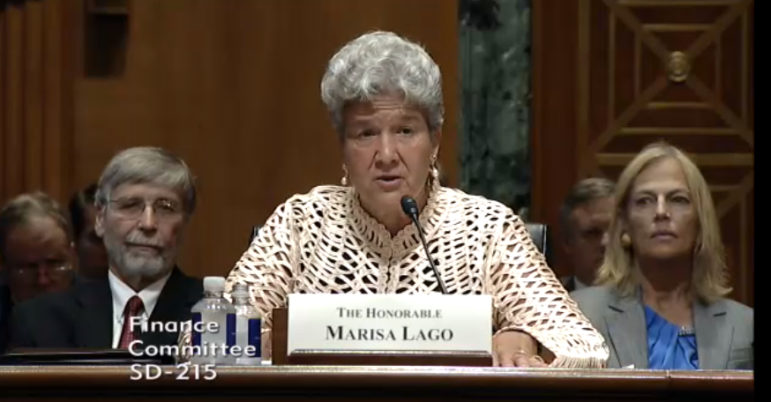
U.S. Senate
Marisa Lago, then an assistant secretary of the U.S. Treasury, in 2015
Marisa Lago, the director of the Department of City Planning and chair of the City Planning Commission as of March, took the helm as somewhat of a mystery figure to veteran planners. A Brooklynite by birth who previously served in New York City government, she has also held important titles in Boston and in the Obama administration and was seen as somewhat of an outsider when she was brought in to steer the ship of DCP. Her first major policy speech, at a Crain’s Business Breakfast on Thursday, was therefore of interest to the crowd of real estate players gathered—as well as to the few community advocates sprinkled among them.
Lago underscored themes that Mayor de Blasio and his administration has emphasized throughout the first term: the importance of adding more density—both market-rate and affordable housing—to accommodate a growing population, of addressing the affordability crisis through job growth, and the necessity of preserving limited industrial land for job-producing industrial firms, among other themes.
Here are five key take takeaways from Thursday morning’s talk:
1) Live-work neighborhoods – While Lago addressed the administration’s interest in encouraging office-space growth in East Midtown and took several questions related to the central business districts, she also emphasized that the economy is moving away from “traditional, 9-to-5 jobs working at the same location five days a week.” She said the contemporary economy creates the desire and opportunity for “vibrant, live-work neighborhoods” in which people can work, live, shop and find entertainment—creating more economic growth throughout the city and reducing New Yorkers’ commutes and reliance on the transit system. She cited the agency’s work to redevelop the Long Island City waterfront, its Long Island City Core rezoning study, office growth in Downtown Brooklyn, and the agency’s Gowanus neighborhood rezoning study as examples of the city’s efforts on this front.
2) Regional Planning – Under Lago’s predecessor Carl Weisbrod, DCP launched a new division dedicated to regional initiatives. Lago, noting that one in four city workers live outside of the city and almost half a million New York City residents work beyond the city’s borders, said they’re currently working with regional partners to advocate for the Trump administration to adequately fund the 2020 census in order to ensure full federal funding and representation, as well as on a variety of transportation initiatives. She called for full funding of the entire Gateway program, a new Port Authority bus terminal, and expressed optimism about cooperating with New Jersey for these efforts.
3) Why Not the High Income Neighborhoods? – Asked why DCP wouldn’t rezone more high-income neighborhoods where there would be less risk of displacement, Lago repeated many of the same arguments that her predecessors have offered, including that they’re picking neighborhoods to rezone that also need investments in neighborhood revitalization, and that Long Island City and Gowanus have high-income residents. She also claimed that neighborhood rezonings have occurred where “communities” or City Councilmembers have asked for them (though that’s clearly not the case for all the rezonings).
4) Balancing Opposing Requests – Many of the questions asked of Lago addressed the concerns of the business community about impediments to cost-effective and efficient development: that rezonings are happening too slowly and that the administration has struggled to counter the opposition from activists, that there needs to be regulatory reform to encourage studios and micro-apartments, and that large floor-to-ceiling length requirements have prevented the use of modular construction, which is cheaper. Lago noted that she often hears the opposite concerns from others—that rezonings are moving too quickly, that big families need bigger apartments, and that higher ceilings allow retail and higher-quality apartments. She ultimately defended the timeline of rezonings, said there needed to be a range of apartment sizes and argued the agency had no need to “apologize” about its floor-to-ceiling length requirements.
5) Industrial preservation and growth – Lago said the agency has been studying the North Brooklyn Industrial Business Zone and will be releasing a plan to promote job growth and new, better-equipped buildings that includes places for “cutting-edge industries” and “denser office growth” but also space “where more horizontal, truck-intensive industry can thrive.” She also mentioned that the City Planning Commission is soon to vote on a proposal to require special permits from self-storage facilities seeking to locate in Industrial Business Zones, and that DCP is about to hold a hearing on a proposal that will require special permits for hotels seeking to build in manufacturing-zoned areas.









One thought on “Second Planning Chief Stresses Ongoing Commitment to Density, Job Growth”
More density? Too bad no one wants it in their own neighborhood.